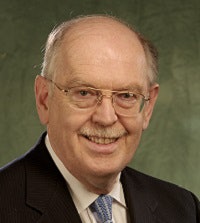President Donald J. Trump’s signing of a controversial executive order Thursday was met with immediate criticism from areas of higher education, particularly aspects intended to address a perception that some schools are intolerant of conservative political views.
Research grants and other federal money, though not student aid, could be withheld from schools judged to have not evenly upheld free speech and other First Amendment rights of students and faculty.
 Peter McPherson
Peter McPherson“Under this executive order, politically-appointed department and agency heads have been directed to take action that could, as President Trump suggested, strip or block federal research funding from universities they subjectively believe aren’t adequately permitting the diverse debate of ideas,” said Peter McPherson, president of the Association of Public and Land-grant Universities. “While enforcement could be challenged in court, this executive order is deeply disturbing on many levels.”
The order:
· States that public colleges and universities are expected to uphold the First Amendment rights of those who are on or visit their campuses and that private schools are expected to comply with their stated institutional policies on freedom of speech.
· Directs a dozen grant-making federal agencies to coordinate with the Office of Management and Budget to certify that colleges receiving federal research money comply with federal laws and regulations relative to free academic inquiry. Those agencies are the departments of Education, Defense, Interior, Agriculture, Commerce, Labor, Health and Human Services, Transportation, and Energy, and the National Science Foundation, Environmental Protection Agency and NASA.
· Directs the Education Department to publish program-level data regarding student outcomes such as debt, loan repayment rates, default rates and earnings in the College Scorecard.
· Gives the Education Department a deadline of January 2020 to submit policy recommendations to the White House on risk-sharing proposals for schools accepting federal student loans. (Addresses criticisms that colleges rake in federal student loans and Pell grants and have the money whether the students graduate or not – and when students default, taxpayers pay for it, not schools.)
Proponents say the issue is about access and accountability. They cite a perceived liberal bias among instructors against individuals and groups with more conservative views not being allowed to speak on college campuses or being threatened, shouted down or otherwise blocked when they were given a forum.
Other leading higher education organizations, including the American Association of University Professors, issued statements critical of the order’s free-speech angle.
AAUP executive director Dr. Julie Schmid called it “a solution in search of a problem” and a troubling attempt to “undermine the public trust.”
“It is also troubling that in his remarks the president sought to drive a wedge between students and faculty, casting his executive order as a ‘clear message to the professors’ that their funding was now at risk while also raising the specters of ‘political indoctrination’ and ‘coercion,’” she said. “Given the vague nature of the order, much depends on implementation. It remains to be seen if the executive order, in allowing cabinet agencies to draw up their own guidelines that could outline what the administration considers noncompliance, will have an impact on federal research and education grants.”
McPherson, expressing similar concerns about its execution and enforcement, called it “plainly unnecessary.” and “very concerning federal overreach.”
“All of this is not to say public universities are perfect,” he said. “Universities are often faced with limited information, passionate and provocative speakers and even threats to public safety. By their own admission, public universities need to constantly revisit policies and procedures to allow a diverse array of opinions to be heard while preventing acts of violence. There is a legal system to ensure the First Amendment is upheld. To inject political decision-makers based in Washington into the mix would turn this entire process on its head.”
In a separate statement addressing the order’s directives toward improving transparency, McPherson said the administration’s interest in that is welcomed and urged Congress to pass the College Transparency Act.
Carrie Warick, director of policy and advocacy at the National College Access Network (NCAN), said the media has mainly focused on the free speech elements of the order. However, “the additional sections will actually be more likely to impact the underrepresented students with whom NCAN members work,” she said.
The focus on consumer information and data transparency is an important step forward in helping students select a program of study for higher education, Warick said.
“The addition of student loan balances and income earnings to the College Scorecard will provide better information for students, but it will also allow policymakers to more easily determine the value of that data in any future accountability systems designed through the reauthorization of the Higher Education Act,” she added.
Ahead of an event it is hosting Monday to launch its Campus Free Expression Project, the Washington-based Bipartisan Policy Center was among those weighing in prior to the issuance of the executive order.
Project director Jacqueline Pfeffer Merrill issued a statement saying that Trump “is correct that free and open inquiry is an essential feature of our democracy,” adding that the center hopes the president “does not impose burdensome requirements or penalties that would make the federal government the arbitrator of campus discourse.”
“Many higher education institutions have not succeeded in fostering a full and robust culture of free expression,” said Merrill. “College and university leaders must seize this opportunity to acknowledge valid concerns about the state of campus free expression, to demonstrate that they are true stewards of free and open exchange, and to lead the national conversation about how to educate the next generation to be the leaders who can heal our polarized politics.”
Monica Levitan contributed to this report.
LaMont Jones can be reached at [email protected]. You can follow him on Twitter @DrLaMontJones















